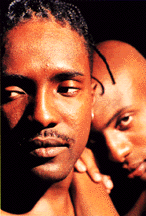

An Anthology of Fiction
by
Gay Men of African Descent
edited by
BRUCE MORROW and CHARLES H. ROWELL
introduction by
Samuel R. Delany
| "These stories celebrate difference--the pain of being different, surely. But also the wonder, the joy, and the truth of difference." --Samuel R. Delany |
|
It gives relief from the sun. And when one queen casts it at another--or at a straight heckler--it raises eyebrows and makes the corners of the lips twitch. You might say shade's a subtler form of dishing, a mode of repartee with a black accent whose connotations are more ironic and notably more nuanced than what's usually meant by the largely straight term "dis (as in the verb 'disrespect')." Like so many terms from gay slang--black, white, and down to camp itself--shade is shot through with the idea of irony; and irony, literary theorist René Welleck tells us, is the aspect of those phrases and rhetorical figures which we are not sure how to respond to--where language opens up, through a moment's hesitation, into an explosion of potentialities, some appalling, some unimaginably wonderful, and all of which seize power for the speaker and, however momentary, articulate wildly subversive possibilities. --From "Introduction: Shade..." by Samuel R. Delany In the Black gay literary tradition that includes such gifted writers as James Baldwin, Langston Hughes, and Countee Cullen, SHADE is the first anthology devoted exclusively to fiction by Black gay men. Here are twenty-two bold and spirited stories by award-winning authors and newcomers destined for prominence, from the United States, Africa, and the Caribbean. Many selections reenvision traditional African-American themes by exploring them from a gay perspective, such as A. Cinque Hick's tale of a son who adds his own "spice" to the traditional family gumbo recipe, and Bil Wright's moving account of an irreverent memorial service for a sassy queen. Other pieces memorably recast the coming-of-age story, such as Larry Duplechan's story of an intense erotic initiation. Still others revitalize universal themes of exile and sanctuary, as in Jaime Manrique's tale of a young Columbian who learns to call himself gay in the United states, only to find no acceptable translation for that word and identity when he returns home. Together these voices bear witness to the cultural changes wrought by the civil rights, feminist, and gay liberation movements, the spread of AIDS, and the emergence of the Black middle class. The brilliant stories in SHADE will cast a long shadow for years to come. |


